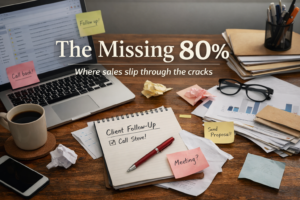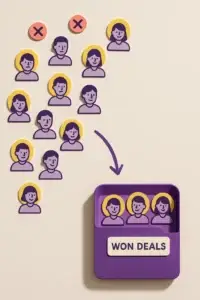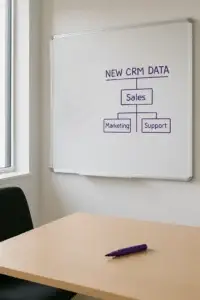In This Article
– How the Get the Right CRM Without the HubSpot Pricing: Introduction
– How the Get the Right CRM Without the HubSpot Pricing: Free Trials and Freemiums
– How the Get the Right CRM Without the HubSpot Pricing: Simple CRMs
– Finding the Right CRM
– What Do You Need?
– What’s Your Budget?
– What Expectations Does the Software Have?
– How the Get the Right CRM Without the HubSpot Pricing: Conclusion
How the Get the Right CRM Without the HubSpot Pricing: Introduction
I’ve talked before about how important your CRM can be for your business and its growth—especially when, as a small business, your resources are precious. But many business (small businesses especially) often find themselves drawn towards the big names of the CRM market, such as HubSpot, Zoho, Salesforce, etc.—in the hope that with a good reputation comes good value for money. Those platforms are capable of amazing things, able to completely transform a company’s multiple business processes. But for HubSpot capabilities, you get HubSpot pricing, which can trap small businesses in contracts and price them out of the software they need, contributing to the phenomenon that 62% of businesses stop using their CRM.
In order to avoid this, businesses need to be savvy about which software they choose to invest in. There are two main routes you can go down, so you can make sure you don’t get trapped.
How the Get the Right CRM Without the HubSpot Pricing: Free Trials and Freemiums
CRM platforms often offer tiered packages, with certain features depending on what’s necessary at that level. Most of them will have more expensive tiers with more features, which are best suited for larger business and corporations.
Often, they’ll offer free trials—for example, for HubSpot—or freemium options, where you receive the free, base tools, but other features are paid for.
These are temporary measures for avoiding paying HubSpot prices for a CRM. Yet this option still serves a purpose: you can understand what works for you, what doesn’t, and what you want to look for if you do want to fully adopt a CRM.
You might find yourself having grown enough to afford one of the packages—which is great! But if that’s not the case, the simple alternative is not choosing a bigger CRM, no matter their reputation.

How the Get the Right CRM Without the HubSpot Pricing: Simple CRMs
Simple CRM
As is often the case with big brands in a big market, the biggest names tend to get all the limelight. However, there are plenty of CRMs out there that are more suited for SMEs, and consequently they’re much more likely to give you the best experience for the right price.
This could require some research—but we’ll give you a head start, by comparing different types of CRM:
Comparisons 1: Which CRM is Best For Your Small Business?
Comparisons 2: Which CRM Suits My Business?
In order to choose the right CRM, you need to ask yourself the questions below to really make the most of your research:
What Do You Need?
The bigger the CRM, the more features and tools the platform can offer. These suit bigger businesses and corporations more because they’ll require more complicated processes, on multiple levels of the business, and many more people will need to be able to access these. HubSpot, Salesforce, Zoho, etc. will have a list of features that simply just keeps going!
Again, if you’re part of a corporation that needs a powerful piece of kit to keep the business functioning, the expense will more than pay off. But if you’re paying HubSpot pricing for a couple of features, it’s not value for money.
What’s Your Budget?
What Expectations Does the Software Have?
Something to consider when researching suitable CRMs is what sort of agreement you’ll be having. Like any subscription, CRM companies usually stipulate a time that you have to be paying, or using the software, and sometimes these are inflexible. Having a 12-month contract, for example, might sound normal, but if you onboard a CRM and then decide it doesn’t fit your business, you have no choice but to continue using it for the remainder of that year. Alternatively, it could be on a month-by-month basis.
There are other expectations too—especially if you’re using a freemium package or free trial. Free trials have an end date, and usually you will automatically be enrolled to the corresponding/next tier up. You might also find that freemium versions of a CRM have almost everything you need, but you’re required to upgrade to get that last feature that helps your business function. These are both things to consider, and if you’re not vigilant about keeping an eye on these expectations, you may find yourself falling into the level of HubSpot pricing.
popcorn, however, doesn’t do that to you. We don’t surprise you with hidden fees or contracts. You can find out more by reading our popcorn Promise here.
If these ideas have been helpful for structuring your research, you can read about more in-depth questions to ask when searching for the right CRM, by clicking here.

How the Get the Right CRM Without the HubSpot Pricing: Conclusion
Choosing the right CRM means getting the balance right between features you need and prices you can pay. If you’re a small business that only needs a few tools to get your CRM journey started, the answer is simple: don’t go for the big and flashy. Zoho, Salesforce, HubSpot—their flashy capabilities mean HubSpot pricing is also flashy, and you business isn’t there yet. In the meantime, you’ll still benefit from having a simpler CRM: one that prioritises the capabilities of businesses like yours, so you can actually succeed and grow. With a good CRM under you, you can build the foundation of growth—and then you can start to think of those bigger CRMs!
How does popcorn’s simple CRM fare against other software? Visit our Comparisons Hub here to get our in-depth guide.
Enjoyed this post? Comment below or read through our blog for more lead management and CRM tips, especially for small businesses.











